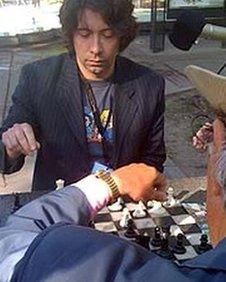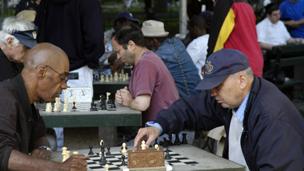Mates with machines
- Published

Chess often appeals to programmers
Thousands of years old, transcending geographical boundaries and cultures, the game of chess is still evolving and new technologies are aiding that progression.
Simon Terrington has made a documentary called Seeking the Endgame for BBC World Service about the technical and cultural changes in the game. "I have been a keen chess player since I was very young. My dad taught me to play chess.
"Back then you would go to your local chess club and there were three people available to play.
"Now you go online and there's around 20,000 people, they all have a numerical grading and you can compare your games in a database for every match played for the last 500 years," he explained on Outriders on BBC Radio 5 live.
"You can analyse it with a computer that can beat the world champion and give you tips on how to improve. So standards have really been transformed."
Telecommunications and online gaming have divided the chess community. Some still believe that the only way to play is face to face and that the psychology of the game involves two people in the same place.

Simon Terrington plays in a tournament in Bulgaria
Alternatively there is a larger and still growing community that loves to play online for the sake of convenience, for international social aspects and style of game play.
Mr Terrington explained: "You can compare it with how the culture surrounding poker has changed.
"There are more younger players now in both cases and I think it is technology that is driving this. Magnus Carlsen who was until recently ranked number one in the world is only 19 years old."
Chess seems to appeal to computer developers because the specification of the game does not change.
"They've done very well. Many people thought 10 or 20 years ago that computers were never going to be that good," Mr Terrington said.
"The moment when Gary Kasparov lost to the computer known as Deep Blue was a big moment for the chess community and quite a shocking one for him.
"When the Hydra computer beat Michael Adams, one of the best chess players in the world, five and a half to a half, we realised that these computers were contenders.
"Kasparov suspected that a human was helping Deeper Blue because it was thinking so strategically - but the question there is what human could help a computer to beat Kasparov when he is the best in the world?"

Some players prefer face to face matches
There are different schools of thought when it comes to intelligent machines playing chess.
Some believe that computers have advanced in order to play the game at a far higher standard. On the other hand, some think that if these machines can successfully compete, it might imply that chess is a trivial game.
"Kasparov would say that chess is idealised psychological warfare," said Mr Terrington.
"For him it is all about being human. But psychological warfare doesn't work with computers.
"There are more mathematical players like Vladimir Kramnik or the current world champion Viswanathan Anand.
"They play the pieces rather than the person but they still admit that there is still a competitive human dynamic.
"I think it is definitely about what it is to be human because it is the mistakes that can be exploited that give the beauty and the genius and the surprise in the game."
Listen again to Simon Terrington's World Service documentary Seeking The Endgame.
- Published23 July 2010